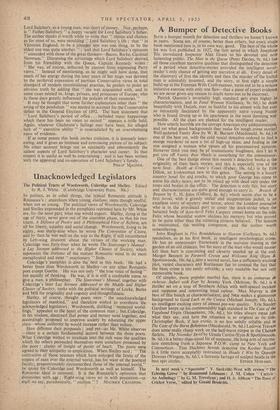A Bumper of Detective Books
SUCH a bumper month for detection and thrillers we haven't known in years. Some are, of course, better than others, but every single book mentioned here is, in its own way, good. The best of the whole lot was first published in 1927, the first novel in which Josephine Tey introduced Inspector Alan Grant to his devoted and no' lamenting public. The Man in the Queue (Peter Davies, 9s. 6d.) has all those excellent narrative qualities that distinguished the detection of a period when detective-stories provided the intelligent novel. reader's only chance of getting any narrative at all. Every detail of the discovery of first the identity and then the murder of"the knifed man is admirably invented, and the story, at first sight a simple build-up in the Freeman Wills Croft, manner, turns out to be a serious inductive exercise with only one flaw—that a piece of expert evidence we are never given any reason to doubt turns out to be incorrect. Patrick Quentin's invariably high standard gets even higher in characterisation, and in Fatal Woman '(Gollancz, 9s. ad.) he deals beautifully with Duluth, ever so faithful to his absent wife but ever so innocently fascinated by the apparently naive young Nanny who is found strung up in his apartment in the most damning way possible. All the clues are planted for the intelligent reader.
How utterly horrible are the corrupt American city adthinistrations, and yet what good backgrounds they make for tough crime stories! Well jacketed Vanity Row by W. R. Burnett (Macdonald, 9s. 6d.) is one of the best yet, with the cold venial detective ordered to find a stooge murderer to save a lot of high-up skins, and finding in the one assigned a woman who upsets all his preconceived patterns. However tired you may be of transatlantic toughness, don't let it put you off Vanity Row which is something for the connoisseur.
One of the best things about this month's detective books is the originality of their basic stories, and this is especially true of the next four: Death at Crane's Court (Faber, 10s. 6d.) is by Ellis Dillon, an Irishwoman new to this genre. The setting is a luxury country hotel for old crocks, to which poor George has come to nurse his dicky heart, not to be mixed up with dead cats under the roses and bodies in the office. The detection is only fair, but story and characterisation are quite good enough to carry it. Breach of Reason by E. H. John (Gifford, 8s. 6d.) which seems also to be a first novel, with a' grossly unfair and inappropriate jacket, is an excellent story of mystery and terror, about the London journalist who is in, the provincial port to cover the dock-strike when the battered body of dare-devil Felix Caspary comes home on the tide, Felix whose beautiful widow idolises his memory but who proved to be quite other than the admiring citizens believed. The tension is maintained, the writing competent, and the author worth remembering. John Bingham in Five Roundabouts to Heaven (Gollancz, 9s. 6d.) specialises, as in his first book, in intelligent psychological crime. He has an unnecessary framework in the narrator musing in the garden of an old chateau, but his story of the man who would sooner kill than hurt is convincing and cleverly snarled up at the end. Margot Bennett in Farawell Crown and Welcome King (Eyre & Spottiswoode, 10s. 6d.), also a second novel, has a sufficiently exciting plot, varied characters and Ruritanian fun to conceal the fact that the basic crime is too easily solvable; a very readable but not very memorable book.
Of simpler, more popular morbid fun, there is an embarras de richesse. Safari with Fear by Jeremy York (Melrose, 9s. 6d.) is a thriller set on a tour of Southern Africa with well-spaced incident and suspense and interesting local colour. Max Murray is the best of this bunch at characterisation,• and Nice makes a glamorous background to Good Luck to the Corpse (Michael Joseph, 10s. 6d.), an intelligent exciting story of almost pre-war quality. Erie Stanley Gardner keeps up his commendably high standard in The Case of the Vagabond Virgin (Heinethann, 10s. 6d.); his titles always mean just what they say, and here the situation is as original as its title. Christopher Bush, if less exotic, is no less solidly reliable and in The Case of the Burnt Bohemian (Macdonald, 9s. 6d.) Ludovic Travers does some really classy work on the half-burnt corpse in the Chelsea flatlets. The Noonday Devil by Ursula Curtiss (Eyre & Spottiswoode, 9s. 6d.) is a better-than-usual bit of suspense, the long arm of retribu- tion stretching froth a Japanese P.O.W. camp to New York and Connecticut. That Hackney Jewish detective the. Kosher Rozzer is a little more acceptably restrained in Heads 1 Win by Quentin Downes (Wingate, 9s. 6d.), a fantastic farrago of scalped heads in the


































 Previous page
Previous page